I’m not always proud to admit this, but I’m a puller and picker.
Trichotillomania is a mental condition that makes the urge to literally pull out your hair irresistible. It may be comorbid with other mental states, both temporary and pathological, or it can be completely independent of them. So far, no one cause has been singled out.
Pullers do feel the hair coming out, and it’s not uncommon to be distressed at how the end results and the behavior itself look, but during bad episodes, the only prevention is immobilization. The most spotlighted places to pull from are head hair, eyelashes, and eyebrows; but despite removing body/facial hair being a normal part of many grooming routines, trichotillomania, or trich, is applicable to ALL hair.
Personally, I save more of my compulsions for dermatillomania, a similar condition with skin being the target, and my hair pulling has been limited to my lashes and facial hair. It wasn’t until I developed calluses on my fingers from the repetition that I realized things had gone beyond regular aesthetic choices, and I began looking into this condition in earnest. Honestly, I’m waiting anxiously for the day that the people around me choose not to be polite about me not being able to stop myself in public settings.
But we do still need to talk about this. Especially when trich affects the hair on our heads, and especially since that hair holds so much significance for those of us in the natural black community.
I spoke to two amazing women, Destiney and Ahleah, about their experiences with trichotillomania.
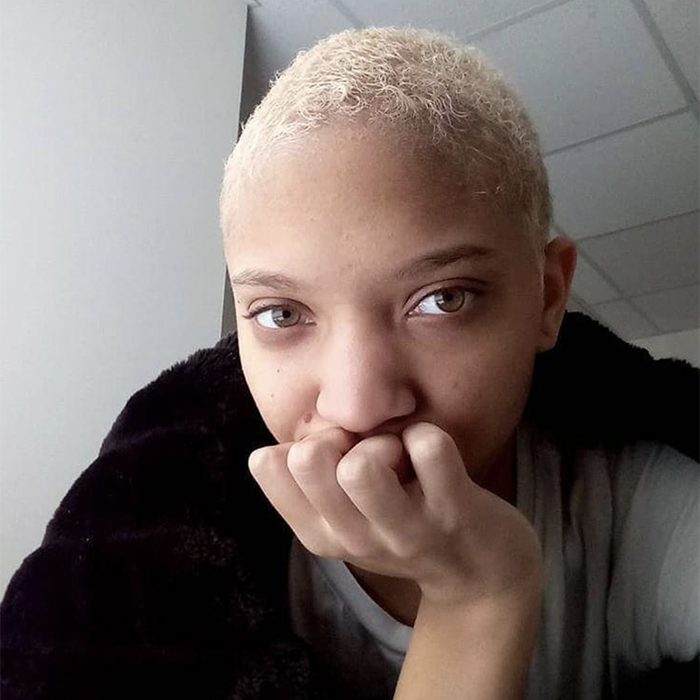
Image: Aleah
Here’s what they had to say:
How long have you been pulling?
Ahleah: “I’ve been pulling for about…9 years give or take. I’ll be turning 22 [soon] as a frame of reference. So I was 13 when I began, the year before I started high school.”
Destiney: “I’ve been pulling my hair since I was about 11 years old. I’ve been dealing with this disorder for about 11 years now.”
When did you first hear of trichotillomania? What were the circumstances of finding out that you had it and how did it feel to put a name to it?
Ahleah: “I first heard of Trich from a book I had. It was an assortment of random activities and information geared for girls. It mentioned Trich as a factoid of condition when mention the phrase of one being stressed enough to pull their hair out. It was long before I’d ever started myself. I actually self-diagnosed remembering the book when no one else knew my condition. Remembering it made me feel a little better. I’m sure I would have been more relieved if I wasn’t the one with the most knowledge to begin with.”
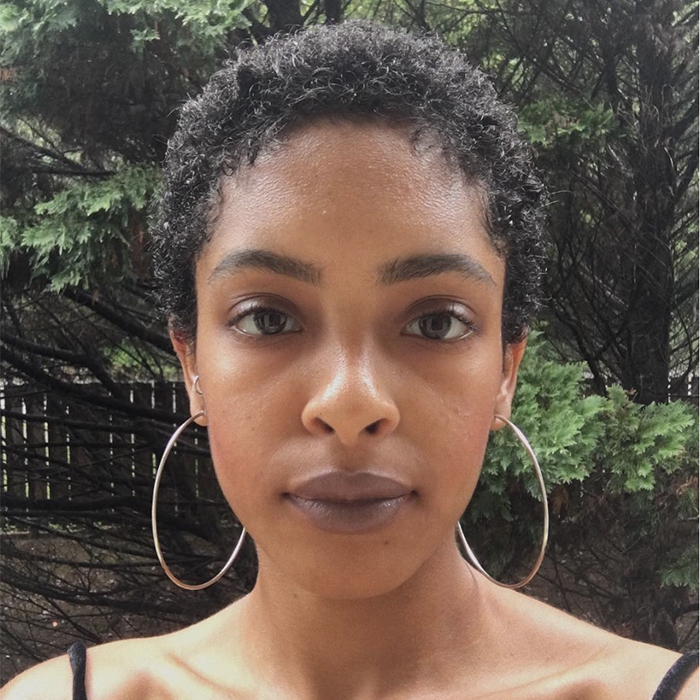
Image: Destiney
Destiney: “I actually diagnosed myself once I started pulling so I found out about it when I was around 11 years old. If anything, I felt ashamed and really confused. I thought something was deeply wrong with me. To be honest, it felt better not knowing exactly what the disorder was. I think there was some kind of comfort in the unknown. Like, if there wasn’t a label to this then it is just part of who I am rather than what I’m going through.”
What steps, if any, have you taken to hide it?
Ahleah: “Mostly by wearing wigs. It was the acceptable and quickest solution with me starting highschool and the one I’ve stuck with the most. I’ve worn some caps and beanies a few times.”
Destiney: “Oh, a bunch. I wore weaves and wigs. If I was pulling out my eyebrows I’d definitely use eyebrow filler to cover that up. I did everything I could to hide this part of myself to the world.”
What methods do you use/have you used to stop yourself? Did any fail? Did any work?
Ahleah: “Wigs were my first big method and 2nd most successful solution. They help for the majority, but the back ends and side burns are still easy to reach. And the wig has to come off at the end of the day. Shaving my head has proven to be the most successful. I haven’t figured out how to shave it smooth and cleanly myself yet so I just buzz it completely down. There’s no hair to pick and the time it takes to grow back is a long enough stretch to wain out the urge quite a bit. I mostly keep my picking out of public view; I know a method is having friends/family gently deter when you are picking, but I find it actually makes me worse being noticed.
I did go to counseling for a while to try to get help. That’s actually how I self-diagnosed myself. I tried explaining my condition to various counselors and doctors, but none had heard of it. So when I remembered the official name it was more informative for them than for me. Where I went wasn’t particularly the greatest of help; they wanted to focus on other issues (i.e. depression, anxiety”> and prescribing me things for that instead of the trich itself. I believe their reasoning was if they could address them it would cure my trich. They eventually did prescribe something that “worked” and made me not feel the urge to pick but it also made me not feel the drive to do anything. So I had a good month before I relapsed after being cleared from their care. I decided that finding alternative ways to help would be better.
This is not to say counseling and therapy are not helpful! This was just my first experience with counseling and one that I believed wasn’t very focused on my interests. A good counselor will help you address what you wish to focus on, help you find what’s making you pick and go through the various methods that have been discovered for treating such compulsive actions. Also having a person to talk to about it helps and can put you at ease.”
Destiney: “When I was younger, I didn’t really use any methods to try and stop. I kind of just felt really defeated by it most of my life. There isn’t any medication to make it go away, so I just dealt with it. Now I’ve embraced trichotillomania and decided to face this problem head on. I’ve shaved my hair twice and will continue to do so until I have better control over it. I’m taking better care of my hair by using a lot of castor oil and essential oils as well. That definitely helps soothe my scalp when I’m getting the urge to pull. I also try to keep my hands busy. So, I’m starting to draw a lot again and that helps me focus on something else rather than my hair.”
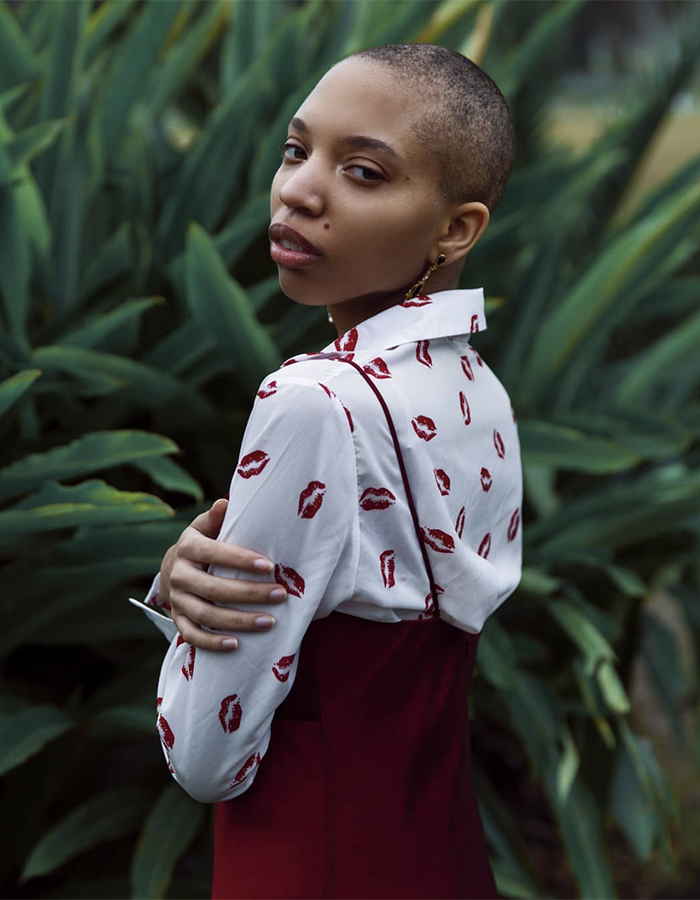
Image: Ahleah
What impact has the natural hair community had on you? Envy? Inspiration?
Ahleah: “My whole trich journey really began with an unloved relationship with my hair. I wore braids for several years, went to salons and got relaxed and straightened just to be braided back up, and at that age I really felt straight hair was the epitome of feminine beauty. So I begged my mom that final year of middle school to let me straighten my hair. But that was the same year I began my descent.
I went from lovely 16 inches down to 14, 12 and lower and I chewed it off and eventually just pulling. I never loved my natural hair and honestly never got to enjoy its true free state because it was always just in plats for so many years. And when I did get more exposed to women with beautiful ‘fros and curls, not only did I no longer have the hair to even participate; but I always thought every other girl I saw rocked it and I could never do so. Now I kind of look at all hair with a sense of longing and admiration. I pin a lot of tapered fros and looks just as inspiration for if I can ever grow it all out again.”
Destiney: “The natural hair community has inspired me to become more of my authentic self. I no longer care about people’s opinions of me and my hair because I know who I am. I know that I’m beautiful with or without hair and no one will ever make me feel less than because of the length of my hair or my disorder. I love that more Black women are wearing their natural hair, but I do think there needs to be a serious dialogue about trichotillomania and hair within the natural hair community, especially because hair has always been considered important in Black communities.”
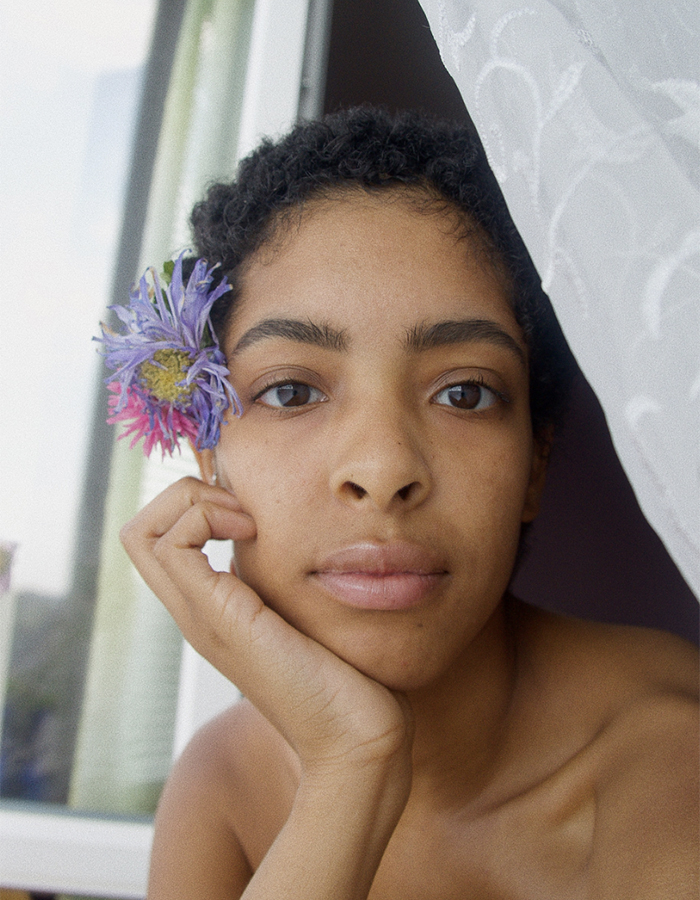
Image: Destiney
Do you have specific triggers or an underlying condition that spurs it?
Ahleah: “My anxiety is one of the biggest general push points. I pull when I’m working/deep in thought, when I’m stressed or nervous.”
Destiney: “When I get really stressed, sad, excited, or worried—that’s when the trichotillomania is triggered. I do my best to keep my emotions in check because I know that they can be major triggers for me. That sounds kind of a bummer because every human experiences these types of emotions, but that’s my reality.”
Once you realized the condition had a name and other people experiencing it, how did it feel?
Ahleah: “I always end up telling people how my hair is the way it is. People are quick to say I’m brave to rock the buzz and that I look good, chic, or fashionable. So when they do ask I say it’s because I have trich. Majority of people don’t know what it is, but it’s nice in finding the few that do and have had it. A lot of people have gone through it and still do and it’s comforting to know I’m not the odd one out, as well as to have an official name to tell people when they ask questions.”
Destiney: “I felt like something was terribly wrong with me. I felt like an outsider and was pretty depressed about it. It’s always comforting knowing other people experience these types of disorders, but I still didn’t feel like I could talk to people about it because of how ashamed I felt about myself.”
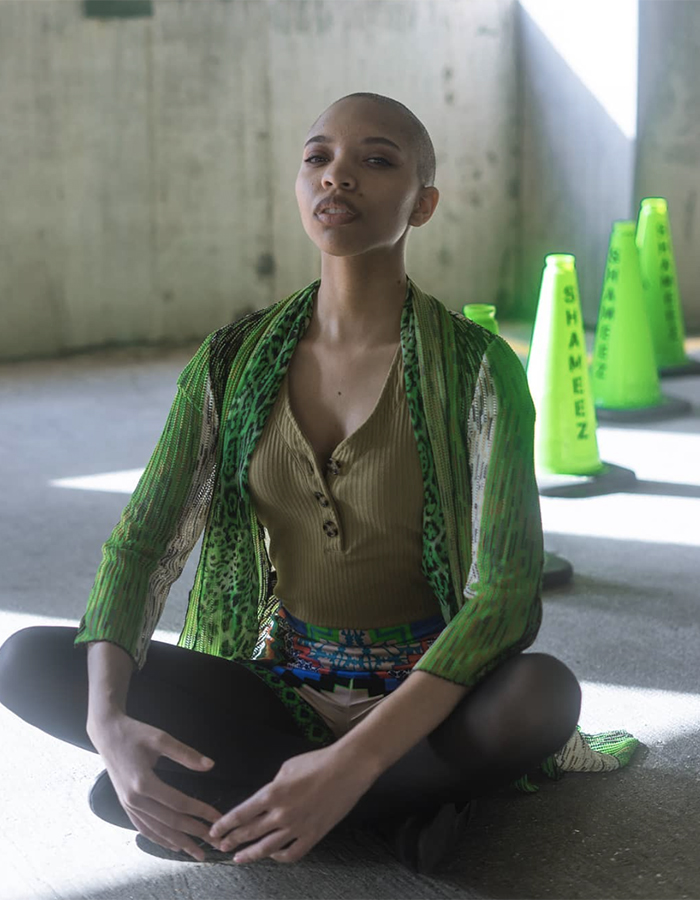
Image: Ahleah
If you’ve stopped or slowed, what helped you most?
Ahleah: “I don’t think I pick nearly as much. Shaving has helped, as well as just taking care to not be as stressed.”
Destiney: “Definitely shaving off my head and wearing my lil bald head out! I wear my trichotillomania Every. Single. Day. That is freeing for me. I feel better about myself because I’m not hiding it anymore, it’s awesome. If I get the urge, now, I have to do something else to calm myself down and not pull my hair because I don’t have any to pull!”
Any products/practices that you’d like to recommend? Could be hair care, prevention, mindfulness, anything!
Ahleah: “Counseling I think is good if you feel you’re having trouble finding methods to stop yourself or you don’t know where to begin figuring out what’s your problem points. Hair care is actually really nice in my opinion! I shave about once a month since that’s the longest I can go before the urge resurfaces, but I find getting products for your head and scalp is helpful. Not just in the sense of “I want to grow my hair back”, but I find I don’t want to damage what I’ve taken the time to put love into. Plus the texture of certain products can help bring you awareness of when you pull and help you take a moment to stop yourself and think, or just make it harder to grip and pull the hair.”
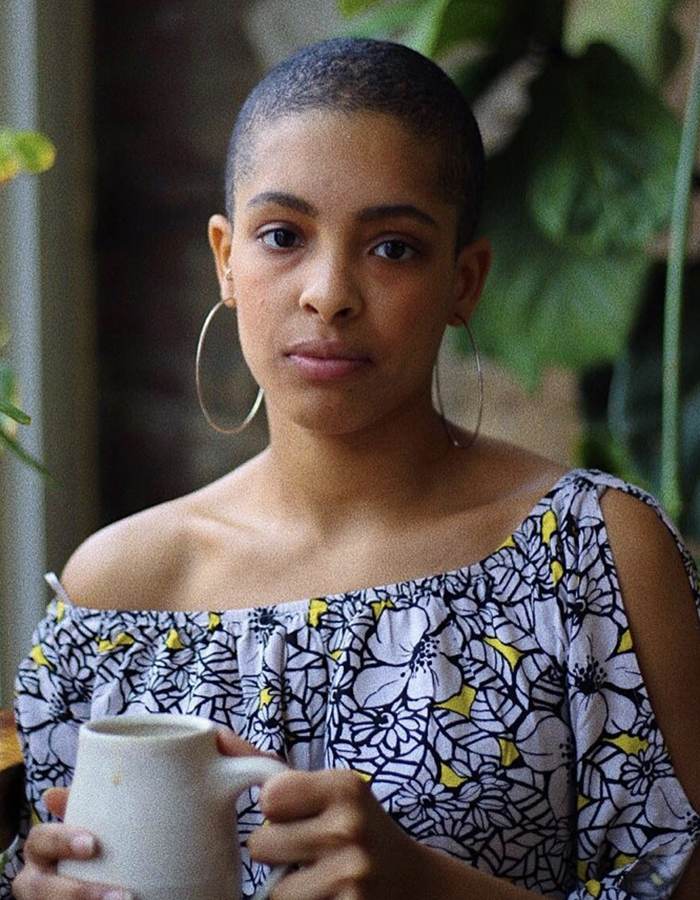
Image: Destiney
Destiney: “I would recommend shaving your hair off if you’re comfortable with that (but I understand if you’re not, trichotillomania can distort one’s self image and be emotionally draining as well”>. I would say pick up a hobby that makes you use your hands! So, if you’re getting really anxious or worried and your trich is triggered you can keep your hands busy doing something else! Hobbies are important for trichotillomania!”
Lastly what words of advice and love do you have for naturalistas going through trich?
Ahleah: “If you do catch yourself, don’t beat yourself up about it. Breathe and brush your hand away. And don’t be discouraged if you find yourself doing it a lot one day or you’ve broken a period of time where you’ve been pulled free. Relapses happen. Continue to put love and care into what you’ve got—even if you’re a buzzed babe like me. I know for a number of years I was focused on regaining what I’d lost and now I’m just working on loving and accepting what I do have. Do what makes you feel good whether that’s wig wearing, scarves or letting what you do have be free. I think loving yourself goes a long way.”
Destiney: “Take it one day at a time! Love yourself with bald patches or full a full head of hair. Love yourself with full eyebrows or sparse ones. Love yourself with eyelashes or without. That’s the most important advice is to love yourself no matter where you are with this disorder. That’s hard to do sometimes. Our society places so much emphasis on a certain type of beauty. You have to have this type of hair or eyebrows or whatever to be considered beautiful. Well, screw that!”
Trichotillomania sucks but it can be manageable for the most part. If you’re secretive about this disorder, at least try telling some close friends and family about it so you have people you can talk to who support and love you. You don’t have to feel alone if you’re going through this or feel like a weirdo because you have this. I also think it’s important for Black women to be more vocal about trichotillomania because of how our hair is viewed in society. We have a lot of power when it comes to discussions about natural hair, especially in the Black community and it’s important for this to be part of that!
Powerful stuff.
The only thing I have left to say really is that I hope for the continued strength of all of us going through this condition, and for the enlightenment and compassion of everyone that doesn’t have it.
Let’s all do our best for ourselves, and for each other.
Do you have experiences to share about Trichotillomania? Any supportive communities to shout out or questions that need answers? Sound off in the comments and we’ll ALL get educated!
